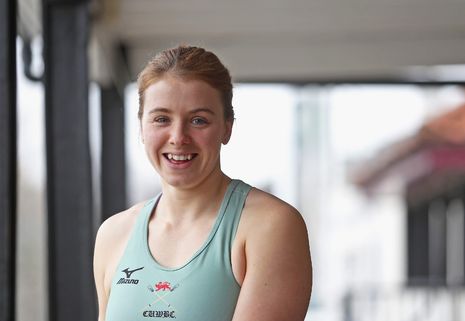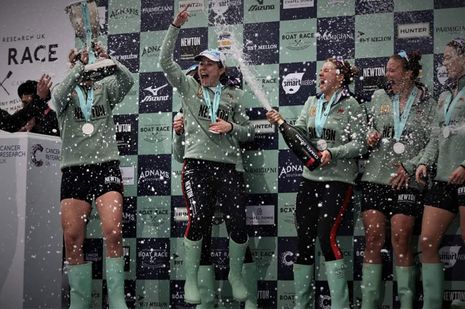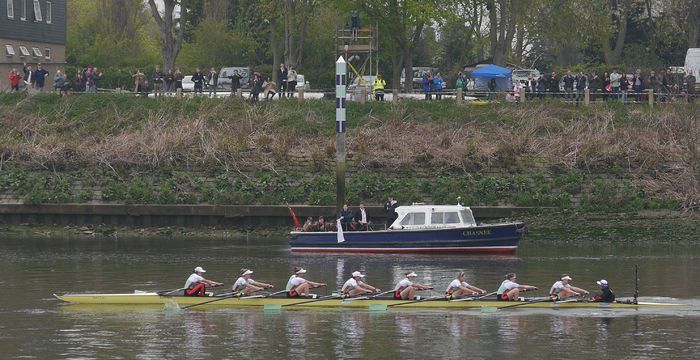
“Your single best performance of the whole year has to be then”: In Conversation with Alice White
In preparation for this year’s Boat Race, Sports Editor Jack Wadding speaks to former two-time winner, Alice White, about her experiences in the women’s blue boat.

Alice White answered my Teams call from a bustling café in New Zealand, which, given the UK’s continued lockdown, certainly caught me off guard. After a quick confession of my own jealousy, we got stuck into the topic at hand: what it’s like to win a Boat Race. This is something of which Alice has especially good experience, having done it not once, but twice. Having arrived in Cambridge in 2016 to undertake an MPhil in Basic and Translational Neuroscience, she is currently in the process of finishing her PhD in Clinical Neuroscience. In that time, she tasted success on the Thames in both 2017 and 2018, setting a record time in the first of her two victories.
Having grown up in New Zealand and carried out her undergraduate degree in Los Angeles, Alice has experience of rowing all over the world. She tells me that the culture of rowing in New Zealand and UK is relatively similar, while her time in the US stood out as somewhat different. “In New Zealand the rowing is a lot of hours and a lot of kilometres,” she says, while “in the US it was a lot more structured because there are rules from the NCAA: you can’t be doing your sport or related activities for it for more than twenty hours a week.” One noticeable characteristic unique to Cambridge, Alice tells me, is the maturity and motivation of athletes from undergrad to alumnus. “It struck me, literally the first day I walked into the Goldie boathouse, the undergrads were so mature and so independent”. She adds that “everyone’s 18 but in the US it felt like they were 12 whereas in the UK it felt like they were 25”.
As those who have rowed in Cambridge will know, the sport, particularly at Blues level, requires a significant commitment of time and energy. “Rowing is a 4-5 hour a day minimum commitment and you really have to sacrifice a lot of other interests,” Alice explains, which is why she has since chosen to stop, allowing her “twenty to thirty hours a week free… to do some more PhD work and also to have other hobbies”.
“It feels like you’re sitting in a coliseum of people looking down on you.”
However, over the last few years, Alice’s rowing experiences provide a wonderful insight into the life of a Blue Boat rower, and particularly, what it’s like to row in – and win – the Boat Race. Sitting at the start line on the tideway, she tells me that “it feels like you’re sitting in a coliseum of people looking down on you” because “you’re the lowest point of everyone – even the umpire is higher up than you.” She recalls: “there’s people on Putney Bridge above you, people on the two banks above you, and there are two helicopters and they’re all looking down” and ultimately, “it makes you feel really small”. In sensory terms, “it feels like this big cacophony of noise bouncing off the sides of the river and off the bridge and the helicopters whirring above you”.
As a result, Alice explains that “it was very hard to focus and to remember the little technical things I had to do to make sure I was rowing my best”, even though she knew that her “single best performance of the whole year [had] to be then”. She tells me that she “just lost all cognitive ability. I just had to sit there like a pawn. Luckily the coxswains that I had in both years were very good at being in control of everything”. In order to remind herself of how best to row, she says, “I had to just say these three words over and over again – I can’t remember what they are now but they were little technical pointers.”

In both 2017 and 2018, Alice’s crew won the race by substantial margins (11 and 7 lengths respectively). Despite this, however, she tells me that the overwhelming emotion at the finish line at Chiswick Bridge was that of relief. All throughout the race, “all I was thinking was ‘don’t mess it up, don’t mess it up’”. Naturally, there is also an element of pride, particularly in her record-breaking 2017 run, when the Cambridge crew completed the race in 18 minutes and 33 seconds. “I’m pretty glad that we still have the record from 2017,” Alice tells me, “I hold my breath whenever there’s a really good Cambridge or Oxford women’s crew.”
In the build-up to the 2017 race, Alice explains that the four year winning streak that the Oxford women had maintained did make a difference to her approach. So much so, in fact, that the Cambridge women named their boat Venit Lux, which, by Alice’s own admission, is a bit “pretentious”, but nevertheless, it had a deep significance. Latin for ‘the light comes’, the boat’s name “partly meant ‘light blue, here we are’ and it also meant we’d had five years of losing, of darkness, and this is a time for us to step into the light”.
The final part of our conversation turns towards this year’s race, which will be staged at Ely without spectators. Due to the straightness of the River Great Ouse, Alice imagines that it may well be the case that “whoever’s ahead at the 1km marker will win the whole race”. Being so narrow, Alice explains that “there’s not enough stream for two crews so there may be some blade-clashing and fighting for that very central piece of the river”. The Thames is comparatively tempestuous, as well as bendy, which “gives you hope if you’re behind,” since you know that “you’ve got those advantages and disadvantages coming up, as well as the effects of the stream.” The fact that there are no such complications at Ely, according to Alice, means that “they’re gonna have to be so in their own head.”
Equally, even though Alice admits that the presence of spectators “makes you feel pretty special,” she doesn’t believe that the lack of fans will make a significant different to this year’s rowers. “Rowers, especially at Cambridge, are so intrinsically motivated that it doesn’t really matter who’s watching and what they’re saying,” she explains, adding that “I’d say that all of the crews will be able to perform at their peak without needing someone to cheer them on.”
Ultimately, only time will tell how different a race on the Great Ouse will be to one on the Thames. And come Sunday afternoon, we will all know the result.
 News / Colleges charge different rents for the same Castle Street accommodation2 March 2026
News / Colleges charge different rents for the same Castle Street accommodation2 March 2026 News / News in Brief: waterworks, wine woes, and workplace wins 1 March 2026
News / News in Brief: waterworks, wine woes, and workplace wins 1 March 2026 News / Angela Merkel among Cambridge honorary degree nominees27 February 2026
News / Angela Merkel among Cambridge honorary degree nominees27 February 2026 News / Climate activists protest for ‘ethical careers policy’1 March 2026
News / Climate activists protest for ‘ethical careers policy’1 March 2026 News / King’s hosts open iftar for Ramadan3 March 2026
News / King’s hosts open iftar for Ramadan3 March 2026









